EDOARDO, PIU’ UNICO CHE RARO! ONE-ACT PLAYS OF EDOARDO DE FILIPPO – AMBRA JOVINELLI’S THEATRE | ROME
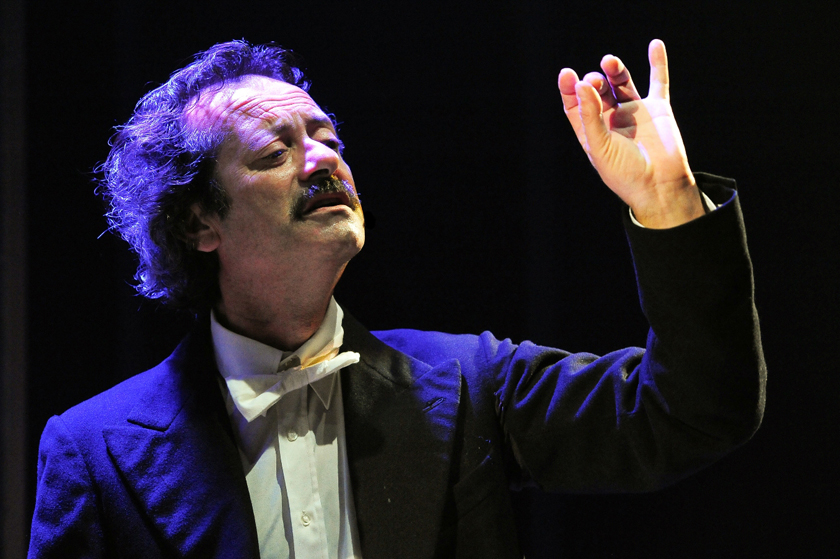
Eduardo, più unico che raro!
One-act plays of – Atti unici di
Eduardo De Filippo
26 December 2010 – 09 January 2011
Ambra Jovinelli’s theatre – Rome
www.ambrajovinelli.com
Text by Roberta d’Errico
“As long as a blade of grass will grow on earth, a fake one will be on stage” this is the Eduardo’s sense of theatre.
This sentence brought the show *Eduardo more than ever unique instead of rare* to the end. The show has proposed some one-act plays of the great Neapolitan Actor and Writer. This sentence says everything about the inborn inclination of the man to represent himself, a phrase sapiently voiced by the actor Rocco Papaleo, calls forth sublime beatitude and joy for such a complicated and distressing art that is the theatre. It reminds us – on the contrary – the naturalist theories that was aimed to cancel the play-act factor, even if through this cancellation the most important theories about dramatization have been resulted during the nineteenth and twentieth centuries. It seems meaningfull that plays of Eduardo’s has been choosen to reopen Ambra Jovinelli’s after a mysterious closing.
The show enacts the following one-act plays Occhiali neri (Black Looking-glass) (1945), Filosoficamente (Philosophically) (1928), Pericolosamente (Dangerously) (1938), Sik-Sik, l’artefice magico (Sik-Sik the magical originator) (1929), La Voce del Padrone (The voice of the landlord) (1932).
By a point of scenographic view the director Giancarlo Sepe aims to the deprivation highlighting the actors and their excellent Neapolitan dialect acting (excluding some elements necessary to contextualize the plays Sik-Sik and La voce del padrone). The stress to act stands out by the difficulty to give material evidence to the dramaturgic essentiality that is characteristic of these one-act plays.
Therefore it is of a focal point the work of text reassessment in order to give back freshness and truth of situations which are reflecting the political and status conditions of Neaples during the period of Eduardo..
The lifeblood of his works remains unchanged as well as everything that wins the classic honours even in the flimsiest forms. Eduardo’s theatrical concept seems to represent perfectly the Aristotelian assumption that “the task of a poet is not to tell the things have happened but which one could happen, or rather those possible according to realism and necessity” (Aristotele, Poetica, 51a, 36-37). Eduardo, like each great theatre personality, got the ontological ability to depict the truth as lifelike and therefore as timeless.
“For the reassessment of this work, we tried to underline mainly the more tragic germ that Eduardo will undo in his later works” – says the actor Rocco Papaleo, who keeps on “ that Eduardo’s texts have been the amplifier of potentialities I had inside myself but couldn’t be expressed till now and they gave me the possibility to reveal a more farcical side of comicalness. By comparing new interpretative challenges the actor can attain to what he owns already inside himself at any one time and, almost as a builder using instruments of different calibre, engages in a work of complete measures and balance in order to bear his sentimental bricolage”.
Writing about this performance it is almost easy to slip to a view around actors and theatre, it is impossible to dwell on a specific talk about the great Neapolitan actor and playwright but we could risk to be shallow and not exhaustive. The intrinsic value of the performance is in the return of Eduardo’s texts; in the skill of each actor; in the feeling that all the actors have been able to create, mainly Rocco Papaleo and Giovanni Esposito; in the meta-theatricalism underlined by musical curtains where the performers move in harmonious and elegant ways to the tune of music composed by Harmonia Team in cooperation with Davide Mastrogiovanni.
The profound work of the director Mr. Giancarlo Sepe has offered to us onlookers, the chance to get at Eduardo’s art, his look at the little human tragedies that make the world and at his grotesque perspective from which a comic sadness shines out brightly.
Roberta d’Errico
Translated by Salvatore Rollo salvatore_rollo@fastwebnet.it
Testo di Roberta d’Errico
Fino a quando ci sarà un filo d’erba sulla terra, ce ne sarà uno finto sul palcoscenico è la frase con cui più volte Eduardo De Filippo ha espresso il senso del teatro.
Con questa frase si conclude lo spettacolo Eduardo, più unico che raro!, in cui vengono riproposti alcuni atti unici del grande attore-autore napoletano. Una frase che dice tutto sulla innata propensione dell’uomo a rappresentare sé stesso, una frase sapientemente detta dall’attore Rocco Papaleo, che ci pone in uno stato di sublime beatitudine e gioia per questa forma d’arte complessa e dolorosa che è il teatro. Una frase che rievoca, per opposto, le teorie naturaliste che del teatro volevano annullare il grado di finzione, anche se da questo annullamento sono nate le più importanti teorie riteatralizzatrici dell’ Ottocento e del Novecento.
La scelta di rappresentare un’opera di Eduardo per riaprire, dopo una inspiegabile chiusura, il teatro Ambra Jovinelli sembra significativa.
Lo spettacolo mette in scena i seguenti atti unici Occhiali neri (1945), Filosoficamente (1928), Pericolosamente (1938), Sik-Sik, l’artefice magico (1929), La voce del padrone (1932).
Dal punto di vista scenografico, il regista Giancarlo Sepe, (fatta eccezione per alcuni elementi di necessaria contestualizzazione in Sik-Sik e La voce del padrone) punta sulla privazione, facendo emergere gli attori e la loro ottima interpretazione in dialetto napoletano. Lo sforzo recitativo emerge dalla difficoltà di dare corpo all’essenzialità drammaturgica che caratterizza questi atti unici.
Focale dunque il lavoro di rivisitazione sul testo per restituire la freschezza e la verità di situazioni che rispecchiano la condizione sociale e culturale della Napoli eduardiana. La linfa vitale delle sue opere, anche nelle forme più sottili e fragili, rimane immutata come immutato rimane tutto ciò che assurge a livello di un classico. La concezione teatrale eduardiana sembra incarnare perfettamente l’assunto aristotelico per cui «compito del poeta non era tanto dire le cose avvenute, ma quali possono avvenire, cioè quelle possibili secondo verosimiglianza e necessità» (Aristotele, Poetica, 51a, 36-37). In Eduardo, come in tutte le grandi personalità del teatro, si ravvisa l’ontologica abilità nel rendere il vero verosimile e quindi eterno.
“Nel lavoro di rivisitazione dei testi – afferma l’attore Rocco Papaleo – si è cercato di evidenziare soprattutto l’embrione più tragico che Eduardo svilupperà nelle opere successive. I testi eduardiani – continua Papaleo – sono stati amplificatori di potenzialità che avevo dentro, ma che fino ad ora non erano venute fuori, mi hanno dato la possibilità di scoprire una comicità più farsesca. Dal confronto con nuove scommesse interpretative l’attore può di volta in volta attingere a quello che ha già dentro di sé e, quasi come un costruttore che utilizza strumenti di diverso calibro, impegnarsi in un lavoro di misure ed equilibri perfetti per dare vita al suo bricolage sentimentale”.
E’ quasi spontaneo, scrivendo su questo spettacolo, scivolare in una visione sull’attore e sul teatro, impossibile soffermarsi su un discorso specifico sul grande attore e drammaturgo napoletano senza rischiare di apparire superficiali e poco esaustivi. Il valore intrinseco dello spettacolo risiede nella restituzione dei testi eduardiani; nell’abilità di ogni singolo interprete; nel feeling che gli attori hanno saputo creare tra di loro, in particolar modo Rocco Papaleo e Giovanni Esposito; nella metateatralità, sottolineata da sipari musicali in cui gli interpreti si muovono armoniosi e leggiadri sulle musiche composte dall’ Harmonia Team, in collaborazione con Davide Mastrogiovanni.
Il profondo lavoro del regista Giancarlo Sepe ha offerto a noi spettatori la possibilità di ritrovare l’arte di Eduardo, il suo sguardo sulle piccole tragedie umane che fanno il mondo e la sua prospettiva grottesca da cui riluce una comica tristezza.
Roberta d’Errico

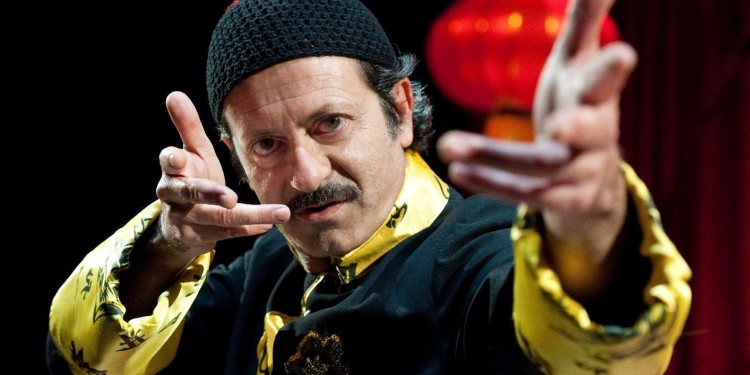
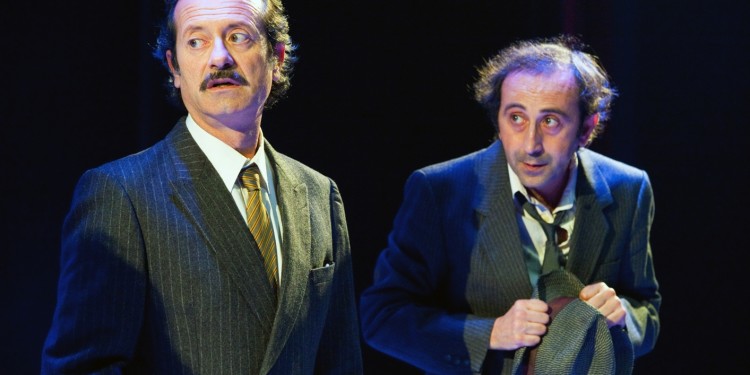
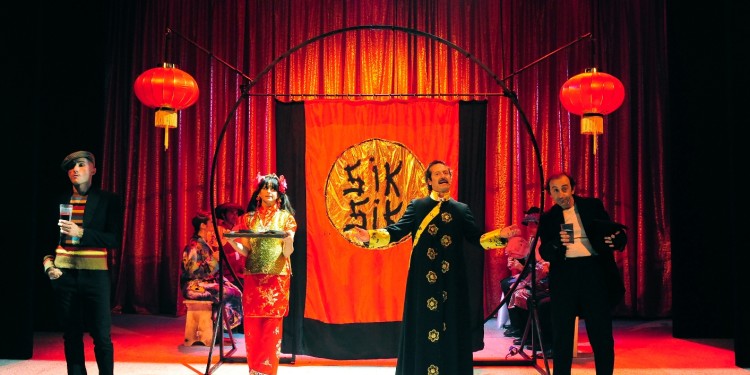
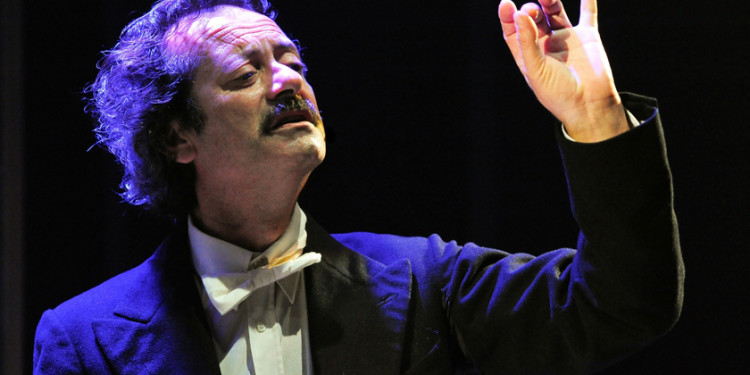
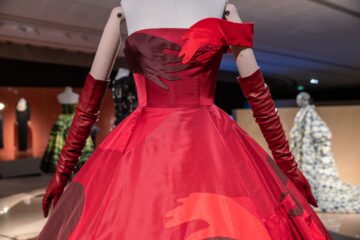
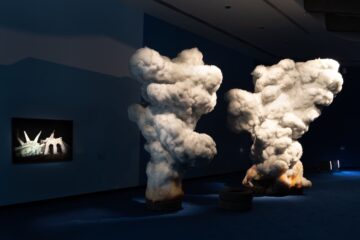

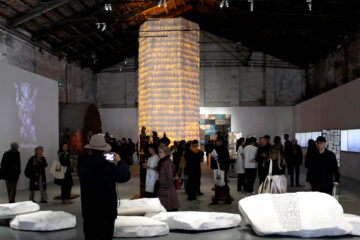

No Comment